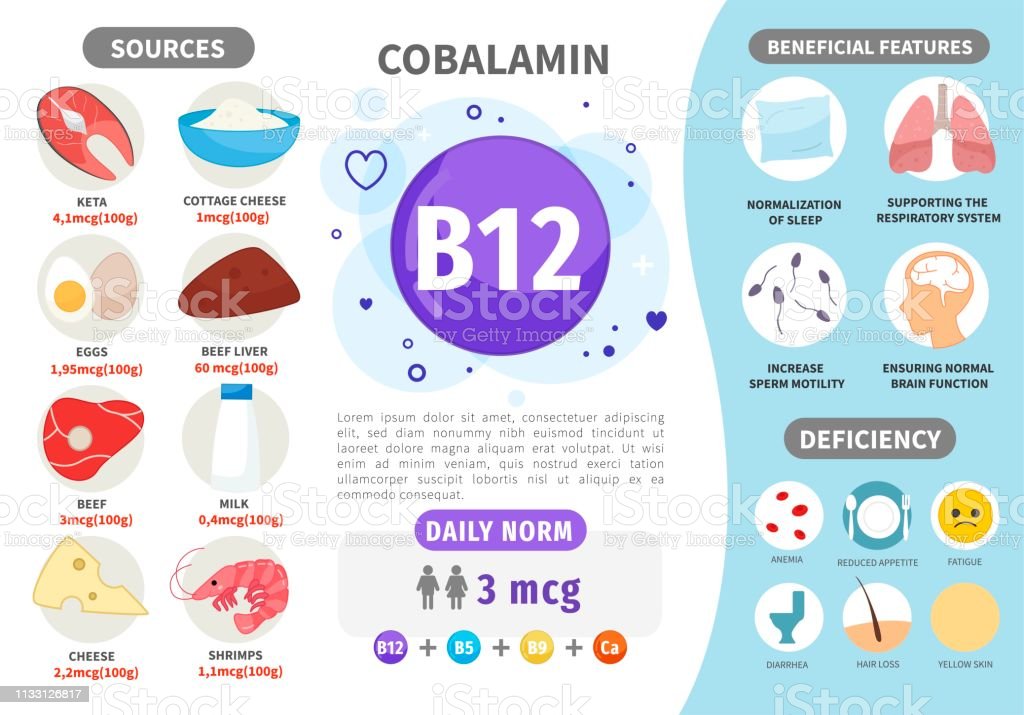Vitamin B12 (or cyanocobalamin) is necessary for the formation of red blood cells, development of neurons, and synthesis of DNA. Its deficiency can lead to accumulation of homocysteine (a neurotoxic compound), anemia, loss of balance, numbness of limbs, fatigue, and impaired memory.
Vitamin B12 deficiency is most pronounced: in old age, after stomach reduction surgery, with reduced stomach acidity or when taking medications to lower it, when taking antacids, with gastrointestinal diseases (Crohn’s disease), on a vegan diet.
Vitamin B12 is stored in the liver. In a healthy human body, there is a supply for several years, but it can be depleted. That is why people who switch to veganism or raw veganism initially feel good, especially if they previously consumed a lot of meat. After a few years, most people return to eating meat and do not experience symptoms of vitamin B12 deficiency.
NORMS OF VITAMIN B12
Daily vitamin B12 requirements depend on age. For adults, it is 2.4 mcg per day, for pregnant and breastfeeding women, it is slightly higher. Vitamin B12 was traditionally prescribed as injections, but now the effectiveness of oral consumption of a dose of 1000 mcg of vitamin per day has been demonstrated, even in people with poor absorption and low acidity. If there are problems with the gastrointestinal tract, vitamin B12 will be poorly absorbed from food. However, the intake of large doses will solve the problem. This vitamin can accumulate and is non-toxic, so it is reasonable to drink or inject it in courses, rather than constantly.
Vitamins of group B interact, so sometimes it is important to drink not vitamin complexes, but specifically those that are lacking. Such interaction exists, for example, with vitamin B9. Its excess can mask a deficiency of vitamin B12. For example, a person eats a lot of vegetables and does not eat meat. If a person does not consume B12 for a long time (several years) and then does a homocysteine test, the result may be normal. This is because B9 and B12 are involved in the same metabolic pathway. But this does not mean that you can do without B12. Masking does not mean compensating.
Another reason to consume vitamin B12 separately is that the cobalt ion in its composition destroys other vitamins. Vitamin B12 interacts with some medications, so if you are taking any medications, especially for the treatment of heartburn, ulcers, and diabetes, be sure to consult a doctor.
WHEN THERE IS A DEFICIENCY OF VITAMIN B12
A deficiency of vitamin B12 can be suspected from the results of a homocysteine test – this substance increases with a deficiency of vitamin B12. However, this test is not absolutely reliable. If you consume a large amount of folic acid, for example, due to a vegan diet, the homocysteine level will be normal.
Another marker of B12 deficiency is megaloblastic anemia, which is diagnosed with a blood test. Anemia caused by a deficiency of B12 is benign, but neurodegenerative processes due to a deficiency of cyanocobalamin are irreversible. Several studies have shown that people with different forms of dementia often lack vitamins B12 and B9, but the therapeutic effect of these vitamins on patients with dementia is quite weak.
It is true that some primates consume insects and other sources of vitamin B12 in their natural habitats, but it is not advisable for humans to rely on insects as a sole source of vitamin B12. The recommended daily intake of vitamin B12 for adults is 2.4 micrograms, and it can be difficult to obtain this amount solely from insects. It is important for vegans and vegetarians to include reliable sources of vitamin B12 in their diets, such as fortified foods or supplements, to ensure that they are meeting their nutritional needs.
Where is vitamin B12 found?
Vitamin B12 is found in animal-derived products, primarily red meat, liver, and fish, as well as eggs and milk. It can be added to food products during production, which should be indicated on the label.
Who needs to consume B12?
- Vegans and vegetarians with a long-standing diet;
- People with reduced stomach acidity;
- People with chronic intestinal diseases (Crohn’s disease, irritable bowel syndrome) or after gastrointestinal surgery;
- People over the age of 50;
- People with HIV;
- People taking antacids or metformin for diabetes treatment.
In some cases, vitamins from group B can be poorly absorbed or even harmful, so rule number 1 is to consult with your doctor before taking any vitamins or medications.





No Comments